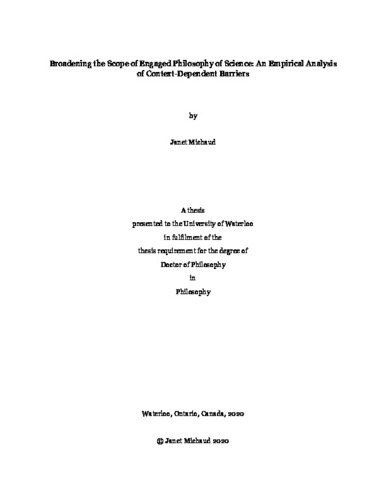| dc.description.abstract | Philosophers of science have increasingly been discussing the social and scientific relevance of philosophy over the last decade. These discussions have included philosophy’s role in addressing scientific problems, clarifying scientific concepts, contributing to science policy, analyzing the role for social and ethical values in science, and more. I refer to this work as broadly engaged philosophy of science. While attention to this work is growing, scholars continue to point out that philosophy of science is not as connected to science and society as it could (or should) be, and that engaged approaches are undervalued. Philosophers debate about which research methods and areas of research in philosophy of science are legitimately philosophical, which communities philosophers of science should and should not engage with, and just how collaborative philosophers of science ought to be with communities outside of their own.
In this dissertation, I analyze key reasons why socially and scientifically relevant work seems to remain marginalized in philosophy of science. Moreover, I explore how narrow conceptions of philosophy of science limit engagement with scientifically-relevant domains and ultimately harm the discipline. Until now, philosophers have been largely discussing engagement from academic philosophy outward to scientifically relevant domains. Even in cases where philosophers of science are arguing for more engaged relationships between philosophical and scientific communities, philosophers are entrenched in conceptions of philosophy as synonymous with academia. However, in parallel, philosophers of colour have been critiquing traditional methods in philosophy as being hostile to diverse practitioners and limiting philosophy’s ability to respond to relevant questions. I challenge this predominant conception by highlighting an approach to engaged philosophy of science wherein philosophers are directly embedded in scientifically relevant domains – i.e., philosophers are employed in government agencies and industry science settings. I also use empirical methods to explore the barriers that prevent broadly engaged philosophy of science from being appropriately valued and rewarded despite its benefits to philosophy, as well as science and society. Then, I argue for the need to develop solutions that are responsive to institutional, departmental, and disciplinary contexts. I offer empirically-informed possibilities for intervening in this historical pattern so that we can recognize the value of this work and support it. | en |

